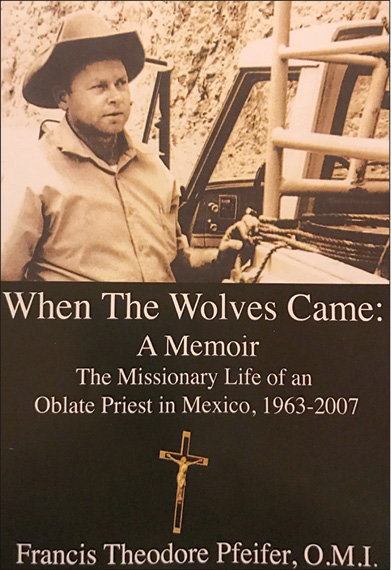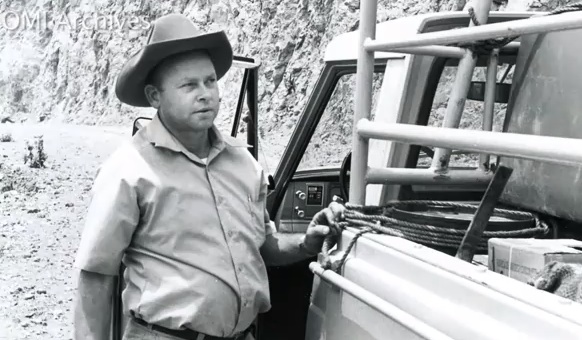 Father Francis Theodore (Ted) Pfeifer, OMI, who defended the indigenous people of Oaxaca, Mexico, against drug cartels during his 44 years as an active missionary priest, died Thursday afternoon, April 19, at the Oblate Madonna Residence in San Antonio.
Father Francis Theodore (Ted) Pfeifer, OMI, who defended the indigenous people of Oaxaca, Mexico, against drug cartels during his 44 years as an active missionary priest, died Thursday afternoon, April 19, at the Oblate Madonna Residence in San Antonio.
He was 85 and had been a priest of the Missionary Oblates of Mary Immaculate since 1959. He celebrated his 65th jubilee of his first vows April 10. Father Pfeifer, older brother of Bishop Michael D. Pfeifer, OMI, bishop emeritus of San Angelo, loved the Chontal and Zapotec Indians whom he served in the Mexican state of Oaxaca.
Known to the indigenous people as “Padre Francisco,” he experienced firsthand why Pope Pius XI in 1938 gave the Oblates the title: “Specialists in Difficult Missions,” and he lived up to the image with courage and determination.
In the early 1980s, drug cartels moved into the Isthmus of Tehuantepec from northern Mexico, tempting farmers with promises of much higher prices for growing poppies and marijuana than they earned by growing corn and beans; but refusal meant certain death.
Approximately 150 of Father Pfeifer’s parishioners were murdered during his years there, the priest recalled in his privately published 2009 memoir, titled When the Wolves Came. In February 1982, Father Pfeifer drove to the pueblo of Santo Tomas Yautepec where a family with small children was being shot at and threatened with having their home burned down. Two children had already been wounded by gunfire.
Invoking the name of God and the Virgin of Guadalupe, Father Pfeifer courageously raised his hands and implored the concealed gunmen to let him take the family out. He backed his truck up to the door and loaded the family into the truck. He and another priest drove them to get medical attention.
On March 8, 1987, Father Pfeifer himself was shot at by a sniper while driving at high speed on the Pan American Highway on the way to a retreat. He was unhurt, and the priest told this reporter that the sniper was not trying to kill him but to frighten him. Twelve bullet holes peppered the upper left side of the roof of the truck’s cab mere inches from his head.
The attack made front-page news in the nearby city of Salina Cruz. He brought pictures of the truck’s bullet holes to the Oblates’ provincial superior in Mexico City. He also prayed at the Basilica of Our Lady of Guadalupe, asking La Virgen to tell him what to do. Although frightened, Father Pfeifer never asked to be transferred to a safer assignment, and he turned one down when offered and remained with his parishioners.
Returning to his parish, he told his parishioners about the attack. Amid copious tears — both his and theirs — the gritty priest asked them if they wanted him to leave. They begged him to stay. “I was aware of the risk and danger in what I was doing. Many of the people I served had been shot at and some murdered. They had no secure place to go. I’m no better than they are; why should this happen to them but not their priest?” he asked this reporter in a San Antonio Express-News interview soon after the attack.
Bishop Michael Pfeifer met with representatives of U.S. House Speaker Jim Wright and of the State Department, enlisting their assistance in bringing the plight of his brother’s parishioners to the attention of Mexican law enforcement authorities.
In a letter that became a foreword to When the Wolves Came, the bishop that “Ted’s life has not been an instant martyrdom, but like so many of the Missionary Oblates of Mary Immaculate around the world, his life has been a slow martyrdom of giving his life piece by piece, imitating Christ, who gave himself totally for us on the cross.”
Father Pfeifer remained in the Diocese of Tehuantepec for seven years after the sniper attack but finally was transferred to a parish of some 75,000 poor people in the slum area of Mexico City. He continued working in Mexico until a stroke forced him to retire in 2007 and return to San Antonio, where he lived at the Oblate Madonna Residence for retired Oblates.
Francis Theodore Pfeifer was born Sept. 11, 1932, in the border town of Alamo, Texas, the fourth of 11 children. Nine lived to adulthood.
The future priest received his first sacraments at St. Joseph Parish in Alamo, which like many border towns was served by the Missionary Oblates of Mary Immaculate. He greatly admired the kind and dedicated Oblates.
At age 14, he began his formation as an Oblate priest in San Antonio at St. Anthony’s Apostolic School (now St. Anthony’s High School), which was then a junior seminary for Oblates. He worked each summer “doing everything from selling root beer to truck driving to farming,” and while in school, he played guard in football, earning all-city honors.
After a year of college, young Pfeifer entered the Oblates’ St. Peter’s Novitiate south of Mission in 1952. In 1953, he entered the Oblates’ De Mazenod Scholasticate (now Oblate School of Theology) in San Antonio. In 1956, he made his perpetual vows as an Oblate — including a vow to “persevere even unto death” — and received his distinctive black and gold Oblate missionary cross.
Father Pfeifer was ordained a priest May 30, 1959, by Bishop Stephen A. Leven, San Antonio’s first auxiliary bishop, at St. Mary’s Church in downtown San Antonio. He celebrated his first Mass in his family’s parish church in Alamo.
With two years of study still to complete, Father Pfeifer attended Pan American College (now the University of Texas-Pan American) in Edinburgh. He served at Holy Family Parish in Corpus Christi and quickly found fulfillment as a parish priest. In late 1962, he received his first missionary assignment from his Oblate superior and arrived in the Diocese of Quiechapa in early 1963.
He served at San Pedro Martir Mission in Huamelula, Santa Maria Magdalena Mission in Tequisistlan and San Pedro Martir Mission in Quiechapa.
As a missionary, Father Pfeifer was more than a priest; he delivered babies, built a clinic and provided health services. Using a donkey he named Chispas (Sparks), he traveled to many pueblos in the mountains to bring the sacraments to the people and help them in any way he could.
Father Pfeifer was preceded in death by his parents, Francis M. Pfeifer and Alice Savage Pfeifer; and sisters Christine Pfeifer, Jean Pfeifer, Mary Alice Ballard, Roberta Freasier, Angela Kapeller and June Shafroth. Survivors besides Bishop Pfeifer include his sisters Colleen Lind, Jane Ellen Hilz and Judy Pfeifer.
Vigil service was Tuesday, April 24, in the Immaculate Conception Memorial Chapel on the Oblate School of Theology campus. Mass of Christian Burial was Wednesday morning, April 25, in the same chapel, with burial in the Oblate Cemetery immediately after the Mass.


